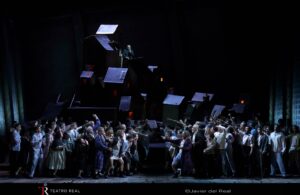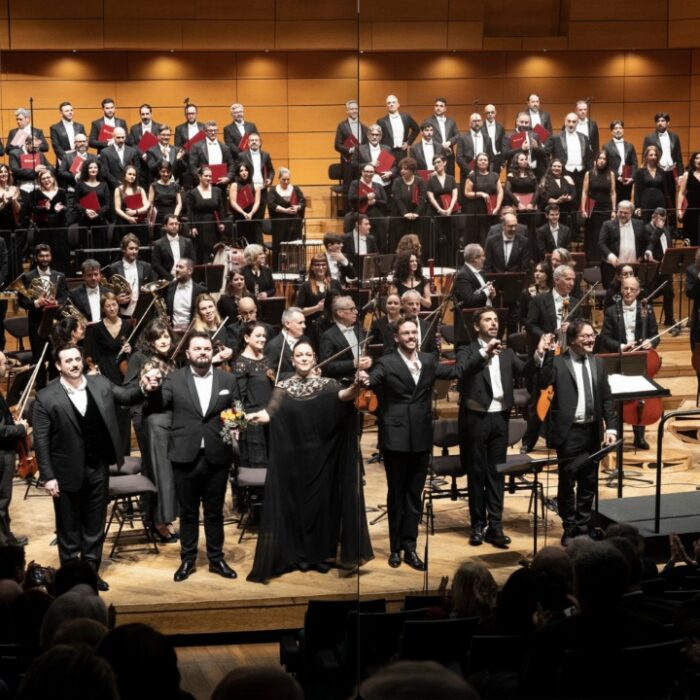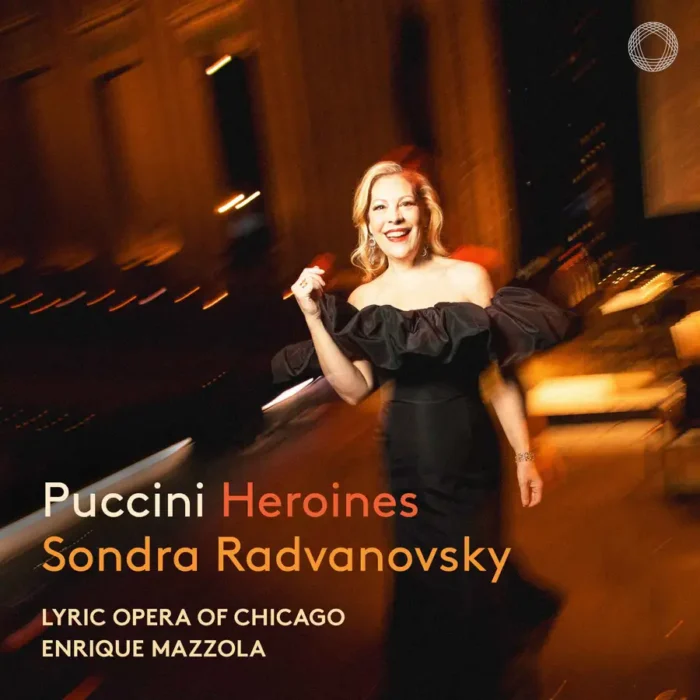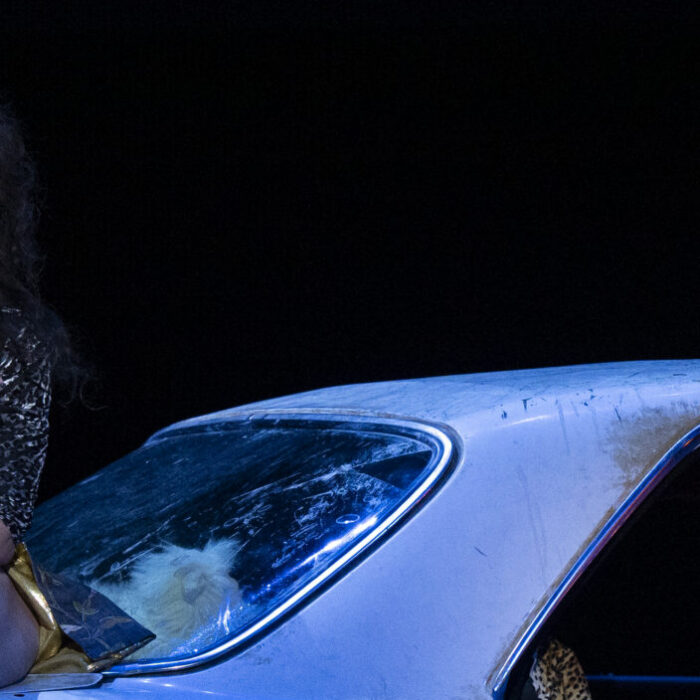
Teatro Real 2023-24 Review: Die Meistersinger von Nürnberg
By Mauricio VillaIt has been 23 years since Daniel Barenboim offered three performances of Wagner’s comedy at Teatro Real. It was the first Laurent Pelly Wagner production, and therefore the expectations were high. And the result did not disappoint an enthusiastic audience which gave strong ovations at the curtain call.
Pelly is a master in “comedy” and he recognizes that he doesn’t like serious operas. He accepted this production because it is supposed to be a comedy. But Wagner’s ideas about comedies are not what we usually see in “opera buffa” and therefore Pally’s trademark of moving the chorus with funny dance movements with the music did not work. Some characters like Beckmesser and all the Meistersingers in general were played with exaggerated gestures, while others like Hans Sachs or Walter have a naturalistic approach. This contrast of acting was shocking, almost like seeing two different operas. As such, Pelly’s production did not work as no one in the audience laughed at all during the performance. I did not understand the concept of filling the platforms, which were placed on the center of the stage with cardboard houses and buildings. But Pelly’s stagecraft and talent is immense, so in general he managed to make the nearly five-hour opera interesting. His best scene by far was the fight at the end of the second act. He really knows how to move lots of people around on the stage.
A Masterful Cast
Canadian baritone Gerald Finley is no stranger to the role of Hans Sachs, as he has already performed it in several productions. His musical phrasing is natural and fluid. The role is quite long and he was able to sustain an uncomfortable tessitura the whole night, including a high G in “wer nichtsweib.” He was quite funny when he was hammering a shoe, interrupting Beckmesser’s serenade. It was a pity that he could not sing over the orchestra in “Tra la lei! Oh!” The highlight of his performance is the monologue which opens the third act, which he sang with great pathos. His characterization was authoritarian but sweet at the same time. He was solemn in his short patriotic intervention at the end of the opera.
Leigh Melrose played the role of Sixtus Beckmesser. His German diction and style were impeccable. Beckmesser’s tessitura is extremely high for a baritone as he is constantly singing around E and F sharp and as such this is sometimes performed by a tenor. Melrose accomplished his role honorably. He obviously opted to sing the long sustained A natural that the score demands in “und wachs!” in falsetto (this is a hard extreme note for a baritone). His characterization was clownish and over acted but I couldn’t tell if it was his choice or Pelly’s direction. His make-up seemed like a gothic character from a Tim Burton movie, and in my opinion did not help much if the intention was to create a funny character.
German tenor Tomislav Mužek played the role of the lover Walther” He has a warm timbre, balancced through his whole register and with a bright high register. He could navigate easily in the passaggio zone of the voice, in a role which is constantly going up to G and As. The role requires stamina and control to sing the whole night in such a high tessitura. He was ardent and passionate during his first scene with Eva in Act one and sang with a beautiful contrast between mezza voce and forte. His high B flat in “Ihr Meister hienied” was strong and carried easily above the soloists, chorus and forte orchestra. The highlight of his performance, because of its lyricism and expansive long lines, was the prize song in the second and third act. His He managed to keep the voice fresh, lacking any sign of strain or vocal fatigue. More importantly, the sound was beautiful.
Nicole Chevalier sang the role of Eva. Her voice has a strong resonant middle register, which is where most of the role is written. She delivered strong A naturals and a high B flat in her longest intervention in Act three, “Sachs! Mein Freund!” Her sound was clear and crystalline, which was ideal for the naïve infatuated girl.
The role of David was portrayed by Sebastian Kohlhepp. The role has a high tessitura and has a long monologue during the first act where Kohlhepp showed his ability for dynamics and his fraseo in the passagio area. But his voice sounds guttural and muffled and therefore his high B flats and B natural sounded distant and small.
Jongmin Park sang the part of Eva’s father Pogner. The role is short, but he has a solo scene at the first act. His voice lacks projection and the high E and F are guttural and small.
Anna Lapkovskaja was an ideal Magdalene, as were all the singers who took on Meistersingers.
A Wagnerian Master
Following his success with “Parsifal” at Bayreuth Festival last year, the Spanish press suddenly named Spanish conductor Pablo Heras-Casado a “great conductor. But the truth is, “Die Meistersinger” was his sixth Wagner opera at the Spanish coliseum after having conducted “The Flying Dutchman” and a whole “Ring cycle.” He was already a great conductor and it was strange that he only got a big recognition after his work abroad despite his numerous successes closer to home. But that’s how the Spanish media works.
Heras-Casado opted for a marked pesante overture, giving weight and protagonism to the “Meistersingers leitmotif” in contrast to the lyrical section of the piece, which was played with lots of dynamic fluctuations and soaring legato lines. He pushed the timbric qualities in Wagner’s orchestration to their limits and the orchestra sounded better than ever. Every single detail, the balance between the brass section and the rest of the orchestra was impeccable. But the intensity was perhaps a bit much as every time the orchestra built up to a forte sound, it covered every single singer. No exceptions. Maybe the balance between the sound of the voices and the orchestra was not fine-tuned, but when seeing a Wagner opera (except in Bayreuth because of the special acoustics) I always doubt if it concerns the director or is just simply impossible for voices to be heard with such a big and dense orchestra. The chorus sounded strong, their voices perfectly melded with the orchestra.
Ultimately, this was an amusing new production by Pelly, although he could not make it as funny as his productions used to be. But Heras-Casado’s delicious music-making and the strong cast made it an unforgettable evening.


